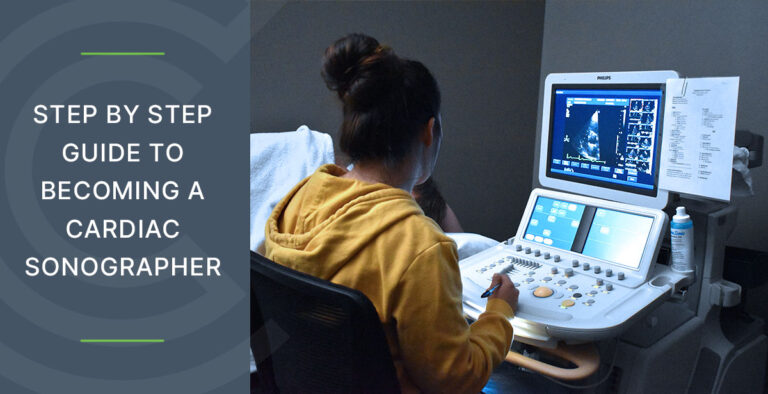If you’ve been contemplating a healthcare career and want to make a difference, cardiac sonography might be a great choice for your future! To help put you on the right path, we’ve put together the steps you need to take to launch a career as a cardiac sonographer. But before we go any further, let’s break down what a cardiac sonographer does.
What is a Cardiac Sonographer?
Also known as an echocardiographer, a cardiac sonographer is a highly trained healthcare professional who specializes in using ultrasound equipment to capture images of the heart and surrounding blood vessels. Doctors and other medical professionals then use these images to diagnose and treat various cardiovascular conditions.
Cardiac sonographers typically work in hospitals, clinics, and other medical facilities alongside physicians and other healthcare providers to perform non-invasive procedures that help identify and monitor heart disease, heart defects, and other cardiovascular conditions. In addition to capturing heart images, cardiac sonographers perform stress tests and other specialized diagnostic procedures.
Education and Training Requirements
While specific requirements can vary depending on the employer, most cardiac sonographers must complete an accredited program in diagnostic medical sonography echocardiography. The program usually takes two years to complete, the coursework usually includes anatomy and physiology, patient care, applied sciences, and medical terminology, and there is typically a hands-on training and clinical aspect that are a vital component of the curriculum.
Complete Clinical Externship Hours
Most programs require a minimum of 600 clinical externship hours, which usually occur in a healthcare setting under the supervision of a registered sonographer. Students learn to use ultrasound equipment, perform echocardiograms, and interpret the results during this time.
Your clinical internship will typically take place in a hospital, medical center, private clinic, or other healthcare setting. At Caris College, all sonography students require 1,320 clinical externship hours throughout the program.
This experience is critically important in preparing you for the real-world challenges of working as a cardiac sonographer and will help you stand out when applying for jobs in the field.
Pass Credentialing Exams
Once you’ve completed the educational requirements, aspiring cardiac sonographers will be eligible to take the credentialing exam. One of the most common credentialing exams is the Registered Cardiac Sonography (RCS) exam administered by Cardiac Credentialing International (CCI). Some programs may have different requirements and may not require a credentialing exam, but most employers prefer hiring credentialed cardiac sonographers.
Once you have passed the RCS exam, you can proudly call yourself a certified cardiac sonographer and pursue your future in cardiac sonography.
Job Outlook and Salary Information
The job outlook for cardiac sonographers is expected to be strong in the coming years. As the population ages and the prevalence of cardiovascular diseases continues to rise, the demand for cardiac sonographers is projected to grow by 10 percent from 2021 to 2031, adding nearly 15,000 jobs to the industry.
Cardiac sonographers can expect to earn a competitive income in terms of salary. According to the Bureau of Labor Statistics, the median annual wage for diagnostic medical sonographers was $75,7590 as of May 2021, with the top 10 percent earning more than $106,000.
With strong demand for skilled professionals now and for the foreseeable future and competitive wages, becoming a cardiac sonographer is an excellent option if you’re looking for a career in the rapidly growing healthcare industry. If you’re looking for a job where you get to make a difference in patients’ lives daily, check out the Diagnostic Medical Sonography Echocardiography program at Caris College. The accelerated 24-month associate degree program includes a 1,320-hour hands-on externship at an actual medical facility, providing you with invaluable real-world experience to launch your career with. Contact us today to learn more!
